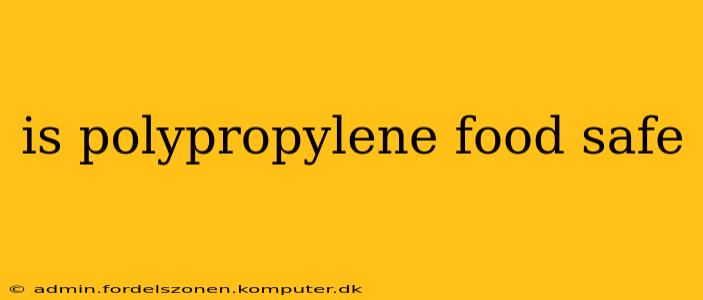Polypropylene (PP) is a ubiquitous plastic found in countless everyday items, from food containers and bottle caps to straws and microwave-safe dishes. But the question on many minds is: is polypropylene food safe? The short answer is a qualified yes, but understanding the nuances is crucial. This comprehensive guide will delve into the safety of polypropylene for food contact, addressing common concerns and misconceptions.
What is Polypropylene (PP)?
Polypropylene is a thermoplastic polymer, meaning it can be melted and reshaped repeatedly. Its popularity stems from its versatility, strength, and resistance to chemicals and heat. It's lightweight, relatively inexpensive to produce, and can be easily molded into various shapes and sizes. These properties make it ideal for food packaging and storage.
Is Polypropylene BPA-Free?
One of the primary reasons polypropylene is considered a safer alternative to some other plastics is its inherent BPA-free nature. Bisphenol A (BPA) is a chemical used in the production of certain plastics and has been linked to potential health concerns. Because polypropylene doesn't contain BPA, it's often marketed as a safer choice for food contact.
Is Polypropylene Microwave Safe?
Many polypropylene containers are specifically designed for microwave use, making them incredibly convenient for reheating leftovers or preparing meals. However, it's crucial to check the labeling on your specific container before microwaving. Not all polypropylene products are created equal, and some may not withstand the high temperatures. Look for clear markings indicating microwave safety.
What happens if you microwave a non-microwave safe polypropylene container?
Microwaving a non-microwave-safe polypropylene container can lead to several undesirable outcomes: the container may warp, melt, or leach chemicals into your food. This can compromise both the safety and quality of your meal. Always prioritize checking the labeling.
Is Polypropylene Dishwasher Safe?
Similarly to microwave safety, dishwasher safety depends on the specific product. While many polypropylene items are dishwasher safe, some may be more susceptible to warping or discoloration at high temperatures. Again, always refer to the manufacturer's instructions for proper cleaning guidelines.
Can I put polypropylene containers in the freezer?
Generally, polypropylene is suitable for freezer storage. Its low temperature resistance makes it a viable option for freezing food. However, just as with microwaving and dishwashing, always check the manufacturer's recommendations to ensure the product is designed for freezer use.
What are the potential downsides of using polypropylene?
While generally considered safe, some concerns exist regarding polypropylene's potential to leach chemicals under certain conditions. High temperatures and prolonged exposure to certain substances may increase the risk of leaching. Therefore, it's always recommended to use polypropylene containers as intended and avoid prolonged contact with extremely hot or acidic foods.
Are there alternatives to polypropylene food containers?
Several alternative materials for food storage exist, including glass, stainless steel, and silicone. Each material possesses its own set of advantages and disadvantages, and the best choice depends on individual needs and preferences.
Conclusion
In conclusion, polypropylene is generally considered safe for food contact when used correctly. However, awareness of its limitations and careful attention to product labeling are crucial to ensure safe and effective use. Always check for microwave, dishwasher, and freezer safety markings before use, and avoid prolonged contact with extremely hot or acidic foods. By following these guidelines, you can confidently utilize polypropylene containers in your kitchen while prioritizing food safety.
